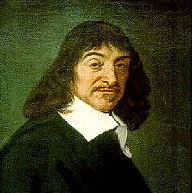Grupo de História, Teoria e Ensino de Ciências – UNICAMP
 "Descartes
e a impossibilidade de ações à distância"
"Descartes
e a impossibilidade de ações à distância"
Capítulo publicado no livro: FUKS, Saul (ed.). Descartes 400 anos: um legado científico e filosófico. Rio de Janeiro: Relume Dumará, 1998. Pp. 79-126. [Para adquirir este livro pela BookNet, clique aqui.]
Resumo: Este trabalho discute as posições de René Descartes e Isaac Newton frente à natureza da gravitação e à possibilidade de ações diretas à distância. Newton procurou inicialmente explicações mecânicas da gravitação, porém, não encontrando nenhum modelo aceitável, preferiu não propor nenhuma explicação. Admitindo que a existência da gravitação era justificada pela indução, ele a utilizou para explicar e prever muitos fenômenos, sem que ela própria fosse, no entanto, explicada. Descartes, por sua vez, tentou explicar a gravidade e os movimentos dos planetas a partir de um modelo mecânico de um vórtice de matéria invisível, criticando duramente autores de sua época que, como Roberval, tentaram introduzir a idéia de ação à distância, pois isso exigiria atribuir-se alma e inteligência à matéria bruta. Estudando os argumentos de vários outros autores anteriores e posteriores a Descartes, o artigo defende a posição de Descartes.
Chapter published in the book: FUKS, Saul (ed.). Descartes 400 anos: um legado científico e filosófico. Rio de Janeiro: Relume Dumará, 1998. Pp. 79-126.
Abstract: This work compares the views of René Descartes and Isaac Newton on the nature of gravitation and the possibility of direct action at a distance. In his early writings, Newton tried to find mechanical explanations of gravitation, but could not find any acceptable model. For that reason he preferred to avoid any mechanical explanation. He admitted that the existence of gravitation could be justified by induction, and used it to explain and to predict several phenomena, although gravitation itself was not explained. Descartes, on the other side, tried to explain gravity and the motion of planets using a mechanical model that accepted the existence of vortices of invisible matter. He criticized authors of his time, such as Roberval, who tried to introduce action at a distance. Descartes argued that this would require that brute matter should be endowed with soul and intelligence. This article analyses the arguments of several authors (before and after Descartes) and concludes that Descartes' criticism of action at a distance is valid.